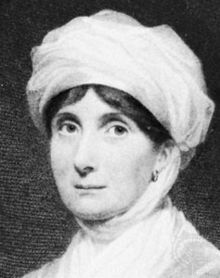Joanna Baillie
Scottish poet and dramatist (1762-1851)
Joanna Baillie (11 September 1762 – 23 February 1851) was a Scottish poet and dramatist. Baillie was very well known during her lifetime and, though a woman, intended her plays not for the closet but for the stage. Admired both for her literary powers and her sweetness of disposition, she hosted a brilliant literary society in her cottage at Hampstead.

The latest spoken still are deem'd the best.
Quotes
edit- Words of affection, howsoe'er express'd,
The latest spoken still are deem'd the best.- Address to Miss Agnes Baillie on her Birthday, line 126; reported in Hoyt's New Cyclopedia Of Practical Quotations (1922), p. 902.
- Think'st thou there are no serpents in the world
But those who slide along the grassy sod,
And sting the luckless foot that presses them?
There are who in the path of social life
Do bask their spotted skins in Fortune's sun,
And sting the soul.- De Montfort (1798), Act I, scene 2; in A Series of Plays.
- A willing heart adds feather to the heel,
And makes the clown a winged Mercury.- De Montfort (1798), Act III, scene 2; in A Series of Plays.
- Sweet sleep be with us, one and all!
And if upon its stillness fall
The visions of a busy brain,
We'll have our pleasure o'er again,
To warm the heart, to charm the sight,
Gay dreams to all! good night, good night.- The Phantom, song (1836); reported in Hoyt's New Cyclopedia Of Practical Quotations (1922), p. 201.
- Oh, swiftly glides the bonnie boat,
Just parted from the shore,
And to the fisher's chorus-note,
Soft moves the dipping oar!- Song, Oh, Swiftly glides the Bonnie Boat; reported in Hoyt's New Cyclopedia Of Practical Quotations (1922), p. 74.
- The tyrant now
Trusts not to men: nightly within his chamber
The watch-dog guards his couch, the only friend
He now dare trust.- Ethwald (1802), Part II, Act V, scene 3.
- The hushed winds wail with feeble moan
Like infant charity.- Orra (1812), Act III, scene 1, "The Chough and Crow"; in Plays on the Passions, Volume III.
Count Basil (1798)
edit- Count Basil (1798); in A Series of Plays.
- The brave man is not he who feels no fear,
For that were stupid and irrational;
But he, whose noble soul its fear subdues,
And bravely dares the danger nature shrinks from.- Act III, scene 1, line 151.
- Some men are born to feast, and not to fight;
Whose sluggish minds, e'en in fair honor's field,
Still on their dinner turn—
Let such pot-boiling varlets stay at home,
And wield a flesh-hook rather than a sword.- Act I, scene 1.
- But woman's grief is like a summer storm,
Short as it violent is.- Act V, scene 3.
External links
edit- Encyclopedic article on Joanna Baillie on Wikipedia
- Works related to Author:Joanna Baillie on Wikisource
- Media related to Joanna Baillie on Wikimedia Commons